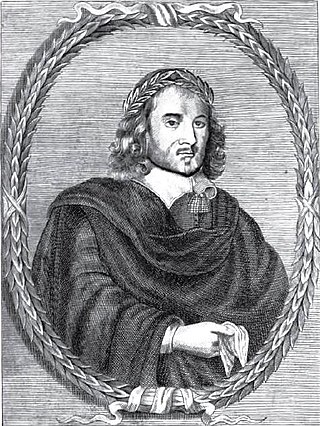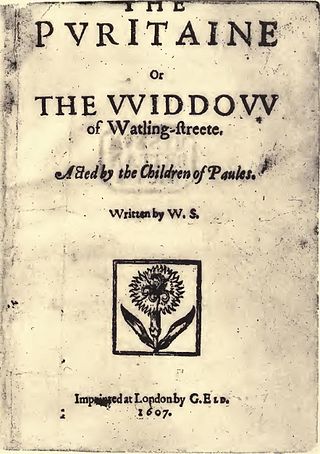
Thomas Middleton was an English Jacobean playwright and poet. He, with John Fletcher and Ben Jonson, was among the most successful and prolific of playwrights at work in the Jacobean period, and among the few to gain equal success in comedy and tragedy. He was also a prolific writer of masques and pageants.
This article contains information about the literary events and publications of 1630.
This article contains information about the literary events and publications of 1613.
City comedy, also known as citizen comedy, is a genre of comedy in the English early modern theatre.

A Yorkshire Tragedy is an early Jacobean era stage play, a domestic tragedy printed in 1608. The play was originally assigned to William Shakespeare, though the modern critical consensus rejects this attribution, favouring Thomas Middleton.

The Provoked Wife (1697) is the second original comedy written by John Vanbrugh. It made its first appearance in Lincoln's Inn Fields in May, 1697. The often-repeated claim that Vanbrugh wrote part of his comedy The Provoked Wife in the Bastille is based on allusions in a couple of much later memoirs, but is regarded with some doubt by modern scholars. It is different in tone from his first play, the largely farcical The Relapse, and adapted to the greater acting skills of the new company of actors chosen for its premiere, who walked out not long before in a dispute with management. The actors' cooperative boasted the established star performers of the age, and Vanbrugh tailored The Provoked Wife to their specialties. While The Relapse had been robustly phrased to be suitable for amateurs and minor acting talents, he could count on versatile professionals like Thomas Betterton, Elizabeth Barry, and the rising young star Anne Bracegirdle to do justice to characters of depth and nuance.
The Mermaid Series was a major collection of reprints of texts from English Elizabethan, Jacobean and Restoration drama. It was launched in 1887 by the British publisher Henry Vizetelly and under the general editorship of Havelock Ellis. Around 1894 the series was taken over by the London firm of T. Fisher Unwin. Many well-known literary figures edited or introduced the texts. Some of the plays published had not been reprinted in recent editions, and most had dropped out of the stage repertoire.

The Puritan, or the Widow of Watling Street, also known as The Puritan Widow, is an anonymous Jacobean stage comedy, first published in 1607. It is often attributed to Thomas Middleton, but also belongs to the Shakespeare Apocrypha due to its title page attribution to "W.S.".

John Warburton (1682–1759) was an antiquarian, cartographer, and Somerset Herald of Arms in Ordinary at the College of Arms in the early 18th century.

The Roaring Girl is a Jacobean stage play, a comedy written by Thomas Middleton and Thomas Dekker c. 1607–1610.
Anything for a Quiet Life is a Jacobean stage play, a city comedy written by Thomas Middleton and John Webster. Topical allusions suggest the play was written most likely in 1621.
The Lady Elizabeth's Men, or Princess Elizabeth's Men, was a company of actors in Jacobean London, formed under the patronage of King James I's daughter Princess Elizabeth. From 1618 on, the company was called The Queen of Bohemia's Men, after Elizabeth and her husband the Elector Palatine had their brief and disastrous flirtation with the crown of Bohemia.
Wit at Several Weapons is a seventeenth-century comedy of uncertain date and authorship.
Amelda Brown is a British actress of stage, film, and television. She trained at the Royal Academy of Dramatic Art, graduating in 1980, and became known for her work in fringe theatre.
Francis Constable was a London bookseller and publisher of the Jacobean and Caroline eras, noted for publishing a number of stage plays of English Renaissance drama.
The Sparagus Garden is a Caroline era stage play, a comedy by Richard Brome. It was the greatest success of Brome's career, and one of the major theatrical hits of its period.
A Match at Midnight is a Jacobean era stage play first printed in 1633, a comedy that represents a stubborn and persistent authorship problem in English Renaissance drama.
Peter Bayliss was an English actor. Bayliss was born in Kingston upon Thames and trained at the Italia Conti Academy and the John Gielgud Company. More than six feet tall, with a voice to match, he supplemented it with a barrage of wheezings, croakings, mutterings and, as the opera singer in Frontiers of Farce, garglings. In 1956 he appeared on stage in "The Matchmaker" at the Royale Theatre in New York and in 1960 he appeared in "Ross" at the Royal Haymarket Theatre in London. His 20 films ranged from The Red Shoes (1948) to Darling (1965). He acted in more than 40 television productions including Please Sir!, The Sweeney, Coronation Street, Lovejoy and The Bill, plus dramas like Bye, Bye Columbus (1990), Merlin (1998) and The Arabian Nights (1999). On radio he was particularly good in Jacobean adaptations, playing characters with names such as Sir Moth-Interest and Walter Whorehound. He appeared in more than 100 theatre productions. He made several films for the Children's Film Unit in his later years.

Elizabeth Knollys, Lady Leighton, was an English courtier who served Queen Elizabeth I of England, first as a Maid of Honour and secondly, after 1566, as a Gentlewoman of the Privy Chamber. Knollys was the grand-niece of Queen consort Anne Boleyn, which made her a cousin once removed of the Queen. Elizabeth married Sir Thomas Leighton of Feckenham in Worcestershire in 1578. He served as Governor of Jersey and Guernsey.
Grace, Lady Mildmay was an English noblewoman, diarist and medical practitioner. Her autobiography is one of the earliest existing autobiographies of an English woman. Originally from Wiltshire, she married Sir Anthony Mildmay in 1567 and moved to Apethorpe Palace, his father's home in Northamptonshire. She practised medicine on her family and others, with an extensive knowledge of medical theory, and a large repertoire of cures. Her writings included memoirs, medical papers and devotional meditations.







